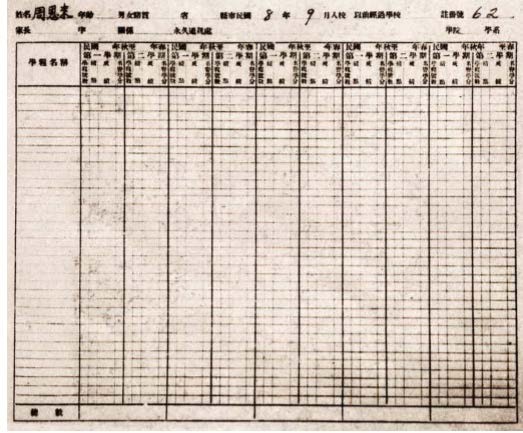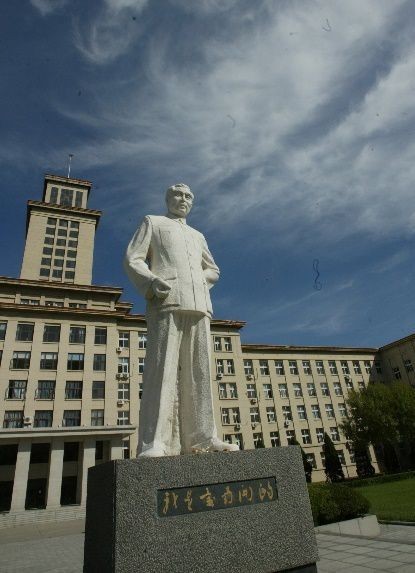Monument and Satue of Premier Zhou Enlai
On the occasion of the 60th anniversary of the founding of Nankai University in 1979, Nankai University established the Premier Zhou Monument on the lake island of Mati Lake. The monument is about 3 meters high and 4 meters wide. It is surrounded by green pines and cypresses with the fragrance of the willow and lotus. The front of the monument is carved with the profile of Premier Zhou and his handwriting, “I love Nankai.” On the back of the monument, it inscribes the handwriting inscription of Yang Shixian, the president of Nankai University at that time, which records the deep root between Nankai's outstanding alumni Zhou Enlai and Nankai University.

Premier Zhou’s Monument
In August 1913, Zhou Enlai, with the ambition of “learning for the rise of China”, was enrolled in Tianjin Nankai school (renamed Nankai Middle School in 1919). Nankai school’s philosophy of “four cultivation” of morality, intelligence, sports and aesthetics as well as the strict teaching management have had a significant influence on Zhou Enlai in youth. During his school days, he was excellent in academics. His achievements in Chinese and mathematics were particularly prominent. At the same time, Zhou Enlai actively participated in extra-curricular activities and showed strong social activity abilities and organizational capabilities. He and his classmates co- founded the “Professionalism and Loyalty Association”, hosted the publication of “Professionalism” and “School Spirit”, and successively served as vice chairman of the speech club, director of the National Literature Association, president of the Jiangsu and Zhejiang Alumni Association, deputy director of the setting department of the new drama troupe, secretary-general of the summer vacation Loyalty Association and the chief leader in his class. In Nankai school’s “The Tenth Yearbook for Graduating Students”, Zhou Enlai was evaluated as: “a gentle and honest man with full of emotions and loyalty to friendship, who will always do his best for his friends and public affairs.” His character and talents were highly valued by Yan Xiu and Zhang Boling. Zhang Boling once said for many times: “Zhou Enlai is the best student in Nankai.”
Zhou Enlai graduated from Nankai School in 1917. In September of the same year, he went east to study in Japan. Before leaving, he wrote the famous poem describing his aspirations of saving the country: “After singing Su Shi’s poetry, I’m going to further my study in Japan. I will engage in sciences and literature in order to save the country. Ten years of hard work is for the cause of the country and people. If this willingness is difficult to achieve, even if I can jump to the sea like Chen Tianhua and die to awaken the people, I can be called a hero.” He spent a year and a half studying in Japan. In April 1919, after learning that Nankai school was about to set up the undergraduate, Zhou Enlai decided to return to China to study, and returned to Tianjin on the eve before the May 4th Movement. As an alumnus, he “went to Nankai every day” and actively involved into the patriotic student movement.

A commemorative photo of Nankai University on September 25th, 1919
(the first on the left in the last row is Zhou Enlai)

Enrollment of Zhou Enlai to Nankai University in 1919
On September 25, 1919, Nankai school established the university department and enrolled a total of 96 students. Zhou Enlai was approved by Yan Xiu and Zhang Boling to study liberal arts without examination. After a few days, the university department decided to change its name to Nankai University. Zhou Enlai became the student of the first phase of Nankai University, whose student number was 62. So far, Nankai University’s Archives still keep Zhou Enlai’s enrollment registration form and commemorative photo at the opening ceremony. During the university, Zhou Enlai spared his time to establish the “Nankai Student Communication Office”, and he served as the “responsible person” to help the alumni. He personally wrote the “Detailed Rules of the Student Communication Office of Nankai University” and published a “Letter to the Nankai Students” in the school journal. He called for the alumni to make suggestions, “for the spiritual development and career transformation of Nankai”.
After the May 4th Movement broke out, Zhou Enlai devoted his energies to leading the Tianjin Patriotic Student Movement. He edited the “Tianjin Student Union Newspaper” and organized and created the Awakening Association. On January 29, 1920, Zhou Enlai and other student leaders led thousands of students from various schools in Tianjin to petition the direct government office and were arrested by reactionary authorities. In the Spring Festival that year, Zhang Boling went to the police station to visit Zhou Enlai and other Nankai students arrested. In prison, Zhou Enlai led the fellow sufferers to persist in the struggle. With rescues from various sides, the reactionary authorities were forced to release all representatives on July 17.
Zhou Enlai had plans to go to Europe to study in prison. After he was released from prison, Yan Xiu and Zhang Boling agreed to use the “Fansun Scholarship” set up in Nankai to help Zhou Enlai and Li Fujing to study abroad. To this end, Yan Xiu specifically wrote a recommendation letter to Vi Kyuin Wellington Koo, the ambassador to Britain. He also set up a special account for Zhou Enlai on Yan’s family account. He had made a remittance once every six months and asked others to forward. Zhou Enlai later said: “At that time, a friend mentioned that I used Yan Xiu’s money, but I became a Communist. Yan Xiu answered: ‘Everybody has his own aspirations, which should be respected’.” In this regard, Zhou Enlai was very grateful and always kept this in mind. Around the foundation of People’s Republic of China, he had asked for the photographs of Yan Xiu from Zhang Boling. After 1949, he personally entrusted Yan Renzeng, the grandnephew of Yan Xiu, to compile the yearbooks of Yan Xiu and file his diary books.
Around the anti-Japanese war, Zhou Enlai, Zhang Boling as well as Nankai alumni began to have more communications and exchanges. “I completed my middle school and got my bachelor’s degree at Nankai Middle School and Nankai University in Tianjin”, said Zhou, who was interviewed by a foreign journalist of North China Star from Tianjin at Yan’an. “Nankai is strict with teaching and active in outdoor activity. I am influenced by the education for the further revolution.” On May, 1938, over one hundred alumni from Nankai gathered at Wuhan to welcome Zhang Boling, the then president of Nankai University, for raising donations. Zhou Enlai participated in the activity and gave an address, “Except for strict exercise and fine spirit, Nankai is also noted for two points, which are the spirit of anti Japanese and defending against humiliation and the focus on scientific exercise.”
During the work in Chongqing, Zhou Enlai often paid a visit to Nankai students and faculties at Jinnan village in Shapingba. He analyzed the national condition, publicized the principles and policies of the Communist Party of China and encouraged them to unite in fighting against Japanese aggression. Combined with the condition, Zhou Enlai gave a new explanation to the motto of “Gong” and “Neng” in a speech to Nankai faculty and students. He said: “ Gong refers to state affairs, which needs us to fight to the bottom and achieve the final success, get the Japanese aggressors out of China; Neng, means learning, to learn the knowledge of anti-Japanese and restoration, to beat Japanese imperialism and build a strong nation.” Many addresses including Resistance, Restoration and Nankai Spirit arose emotions among Nankai faculties, students and alumni.
After the foundation of the People’s Republic of China in 1949, Zhou Enlai shouldered great responsibility and engaged in state affairs as an important national leader of the Party, still paid attention to the development of Nankai University and returned to his alma mater three times for inspection in 1951, 1957 and 1959. During the inspection in 1959, he almost walked through the university and even to teaching building, labs, research institutes, libraries, dormitories and canteens, communicated with students, faculties and delivered the important speech. Staff Canteen has been hanging the precious picture of Zhou Enlai paying a visit .

On May, 1959, Premier Zhou was having lunch at the Staff Canteen during the inspection to
Nankai University

The Sculpture of Premier Zhou Enlai
October 17th, 1989 marked the 70th anniversary of Nankai University. The sculpture of Premier Zhou was accomplished and unveiled in front of the Main Building. The sculpture is caved by white jade in Han Dynasty, 4.75 meters high, situated at the foundation of a platform with 2 meters high. At the front of the foundation engraves the handwriting of Premier Zhou——“I love Nankai”, while the other side of the inscription records the deep historic origin between him and Nankai. The sculpture was donated and built by a Japanese friend called Kaheita Okazaki and Nankai alumni. It is the final work of noted sculptor Fu TianChou. The sculpture of Premier Zhou is dignified and respected, looks towards distance with a smile. Each one in Nankai will forever remember and be proud of the fact that Premier Zhou Enlai is the most excellent representative and the symbol of Nankai spirit.









